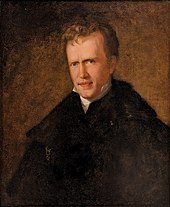Francis Lieber
[2][6] Born in Berlin, Prussia, to a Jewish merchant family, Lieber served in the Prussian Army during the Wars of Liberation against Napoleon Bonaparte.
During his early years in America, he worked a number of jobs, including swimming and gymnastics instructor, editor of the first editions of the Encyclopaedia Americana, journalist, and translator.
100, 24 April 1863), the Lieber Code of military law that governed the battlefield conduct of the Union Army during the American Civil War (1861–1865).
[3][11] Franz Lieber was born the tenth of twelve children to a wealthy Jewish merchant family in Berlin, then the capital of the Kingdom of Prussia.
[14][2] Lieber joined the Colberg Regiment of the Prussian Army in 1815 during the Napoleonic Wars, and was wounded in Namur, Belgium during the Battle of Waterloo.
[7][15] He rejoined his regiment after recovering from his wounds, but developed a typhoid fever and was subsequently treated at military hospitals in Aix-la-Chapelle and Cologne.
[7] He became politically active during this time period, was arrested by Prussian authorities, and held for pretrial detention in Spandau prison from July to November 1819.
[17][7] As the Prussian authorities caught up with him, Lieber left Jena for Dresden to study topography with Major Decker (briefly).
[7] At Köpenick, Lieber wrote a collection of poems entitled Wein- und Wonne-Lieder (Songs of Wine and Bliss), which on his release, with Niebuhr's help, were published in Berlin in 1824 under the pen name of "Franz Arnold".
In London he met American writer and critic John Neal, who was studying gymnastics from Carl Voelker and intent on bringing the movement to the US.
[18] Neal published articles in The Yankee[19] and the American Journal of Education about Lieber's work, and recommending him as "qualified, almost beyond example" as a teacher of gymnastics, and "the chief personage with professor Jahn himself".
Lieber was also acquainted with the outgoing gymnasium administrator, Charles Follen, both believing thoroughly in the importance of training the body along with the mind.
Such writers and jurists as Mittermaier, Johann Kaspar Bluntschli, Édouard René de Laboulaye, Joseph Story and James Kent, recognized in him a kindred mind.
One of his sons, geologist Oscar Montgomery Lieber (see below), joined the Confederate army and died at the Battle of Eltham's Landing.
[34] During the conflict, Francis Lieber was one of the founders and served as the head of the Loyal Publication Society of New York, compiling news articles for dissemination among Union troops and Northern newspapers.
[35] An abridged version of the Lieber Code was published in 1899 in The War of the Rebellion: A Compilation of the Official Records of the Union and Confederate Armies in 1899.
From 1870 until his death in New York City, aged 72, Francis Lieber served as a diplomatic negotiator between the United States and Mexico.
A second son, Alfred Hamilton Lieber (7 June 1835, Philadelphia, Pennsylvania – 18 October 1876, Baden-Baden, Germany), entered the volunteer army at the beginning of the civil war as 1st lieutenant, 9th Illinois Regiment, and was badly wounded at Fort Donelson.
Lieber is cited after Hugo Grotius and Emer de Vattel and before Hersch Lauterpacht as a subsidiary means and an authority in determining the rules of law of war.
